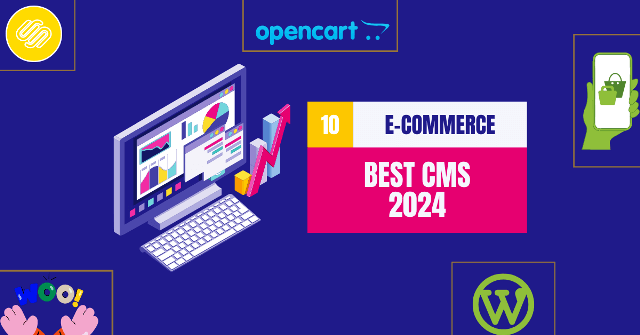In the rapidly growing era of the 21st century, e-commerce businesses have become one of the fastest-growing markets, especially after the pandemic. There is a high possibility that by 2025, the revenue generation of e-commerce businesses will reach up to 7.3 trillion USD, as per the Statista report.
Choosing the best CMS for eCommerce will help you with less workload. All you have to do is choose the suitable content management system (CMS) according to your business’s needs.
The following article will help you find the best CMS for your business to be on top and determine the advantages and disadvantages of various systems to choose the right one.
The Best CMS for eCommerce:
There are plenty of eCommerce platforms you can select for your online business. Still, it is essential to understand the content management system and how it works to choose the suitable option for your website.
Working Principle of CMS
CMS is a content management system that helps maintain and grow your digital business via editor instead of the difficult coding system. You can work on the product pages, make banners, and promote your products.
Types of CMS
There are two types: one is SaaS and other is open-source.
- SaaS CMS:
For people who don’t have a technical background and find it hard to manage a website, this SaaS option is for you. But you have to pay the price. It’s like running a shop with the help of shopkeepers willing to handle all your business stuff and need a handsome amount of a month in the form of a salary.
- Open-source CMS:
For those willing to control the websites on their own, open-source system is for them. Interestingly, you don’t have to pay anything to install the program. You can update the website according to your business’s needs and customize it accordingly.
Top 5 Best CMS for eCommerce
There are plenty of content management solutions based on SaaS and open source availability. Among numerous CMSs, the top 5 best software are as follows. They are on top because of their rating and prices. The following are the recommended website solutions.
- Shopify
- Squarespace
- WooCommerce
- WordPress
- Open Cart
In addition to above key players, other options are Joomla Drupal, Wix and Magento.
1. Shopify:
Shopify is one of the types of SaaS CMS with multiple features that help you save time and effort.
Features:
- The most exciting feature of Shopify is that you don’t have to buy the domain name and web hosting because you can use their servers to host your websites.
- Another feature is the valuable plugins and extensive app stores, which other CMS platforms ordinarily don’t have.
- Shopify has the feature of building your own HTML and CSS code.
Pricing:
Prices start from 29 dollars to 299 dollars for the advanced Shopify.
Pros:
- The interface is user-friendly, with an extensive library with free and paid extensions.
- The use of payment is easy and trustworthy.
- It has the feature of dropshipping.
Cons:
- Though it has multiple themes, most of them aren’t free.
- If you want to use the feature of Shopify, you have to install it
Shopify is best for:
Shopify is suitable for small businesses and those new to this field.
2. Squarespace:
Squarespace is another example of SaaS CMS, and it is suitable for beginners to handle the website independently.
Features:
- Third-party plugins are good and have excellent access to the analytics page.
- Customization is a good feature for the customers.
- There is no limit to products for selling.
- You can have the blogging feature along with the free domain name.
Pricing:
Price starts from 26 dollars to 40 dollars a month.
Pros:
- It has no transaction fees.
- As it is mainly for beginners, the use of it is effortless.
Cons:
- You can have the chat option only for 24 hours. Instead of phone support.
3. WooCommerce:
It is one of the examples of open-source CMS, and a visible growth occurred in the past few months.
Features:
- The main feature of WooCommerce is having a payment gateway of more than 140.
- Another feature is having unlimited customization and much free SEO add-ons.
Pros:
- It belongs to open-source.
- Have seo-friendly features.
- It has excellent security.
Cons:
- It is undoubtedly not for beginners. You should have a good knowledge of the particular field.
- No free domain and hosting.
- Some paid ads-ons.
4. WordPress
The popularity of WordPress can be estimated by a survey conducted by Kinsta Inc., which mentioned that around 60% of WordPress is market share. But, you would need WooCommerce extensions to convert the WordPress into a business website.
Features:
- They have all the payment gateways.
- You can publish your content in videos and articles for free.
- Themes are limitless. They have both free and paid ones.
Pricing:
The price of the premium plan starts from 25 dollars to 45 dollars, but you can use WordPress for free.
Pros:
- It belongs to an open-source CMS.
- They have great options for customization
- There are plenty of plugins.
Cons:
- There will be no technical support.
5. OpenCart:
It is one of the most accessible due to its availability of remaining free. It belongs to an open-source CMS.
Features:
- The most impressive feature is the availability of 14,000 extensions.
- The unique feature is the support of various shipping procedures.
- These free extensions help to add add-ons, popups, etc.
- The dashboard system helps the owner by tracking their performance.
Pricing:
Its price ranges from 99 dollars to 150 dollars.
Pros:
- PHP coding is highly customized.
- Features are all free
- Its extensions help you access the high technology of e-commerce.
Cons:
- As for the modern templates, some of their templates are old.
- You have to make a few payments, like security, hosting, etc.
Conclusion
In conclusion, most of the best CMS for eCommerce are widely available for free. It all depends upon the criteria you are trying to set for your business setup.
Remember, it’s better to do proper research before investing; proper knowledge is mandatory to run a successful business.
Frequently Asked Questions
How Can You Choose the Suitable CMS for your Business?
Well, there are a few things you need to consider before making the decision, for example, your budget, the business you are working for, your knowledge regarding digital marketing, etc.
What are the most used CMSs Working Worldwide?
Most open-source CMSs are currently in use because of their free availability, mainly wordpress.



